| Srl | Item |
| 1 |
ID:
140036
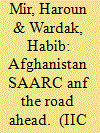

|
|
|
| 2 |
ID:
125004
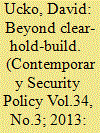

|
|
|
|
|
| Publication |
2013.
|
| Summary/Abstract |
Despite a highly uneven track record, clear-hold-build has remained a dominant, even universal, approach to counterinsurgency. Its prevalence is rooted in its incontestable sequencing of operations and the attendant promise of a linear path towards peace. Yet the appeal of this approach also makes it deceptive and possibly dangerous. Clear-hold-build is not a strategy and must not be mistaken for one, as it has been in Afghanistan, where it inspired false hope for swift progress. Instead, it is necessary to reach a more problematized view of this approach and of what it aims to achieve. This article provides such an evaluation, proposing five principles that should guide its future application. These principles point to the need for a far deeper understanding of how security, development, and governance interact at the local level. Counterinsurgents must understand the relationships between aid and security, between government and governance, and between state and periphery. Where the central government is predatory or lacks support, clear-hold-build also raises difficult questions of authority, legitimacy, and control - questions that counterinsurgents must be capable of answering. Thus problematized, clear-hold-build emerges as a framework with heuristic utility; a schema that can be helpful in planning but which must at the time of application be populated by knowledge, substance, and skill. The implications of these requirements are troubling, particularly for those governments still in the business of armed intervention.
|
|
|
|
|
|
|
|
|
|
|
|
|
|
|
|
| 3 |
ID:
090715
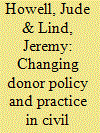

|
|
|
|
|
| Publication |
2009.
|
| Summary/Abstract |
This article argues that the global 'War on Terror' regime has contributed in complex and differentiated ways to the increasing securitisation of development policy and practice. The global 'War on Terror' regime refers to a complex and contradictory weaving of discourses, political alliances, policy and legislative changes, institutional arrangements and practices. This is manifest in aid rhetoric, policy discourse, institutional convergence and programming. These processes have in turn affected the way donor agencies engage with non-governmental actors. On the one hand they have led to new forms of control over charitable agencies; on the other hand they have created new opportunities for interaction and resource access to 'newly discovered' civil society actors such as Muslim organisations and communities. The article explores these issues through the lens of development policy and practice by four donor countries, namely, the USA, Sweden, the UK and Australia.
|
|
|
|
|
|
|
|
|
|
|
|
|
|
|
|
| 4 |
ID:
094593
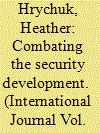

|
|
|
| 5 |
ID:
078993
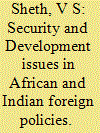

|
|
|